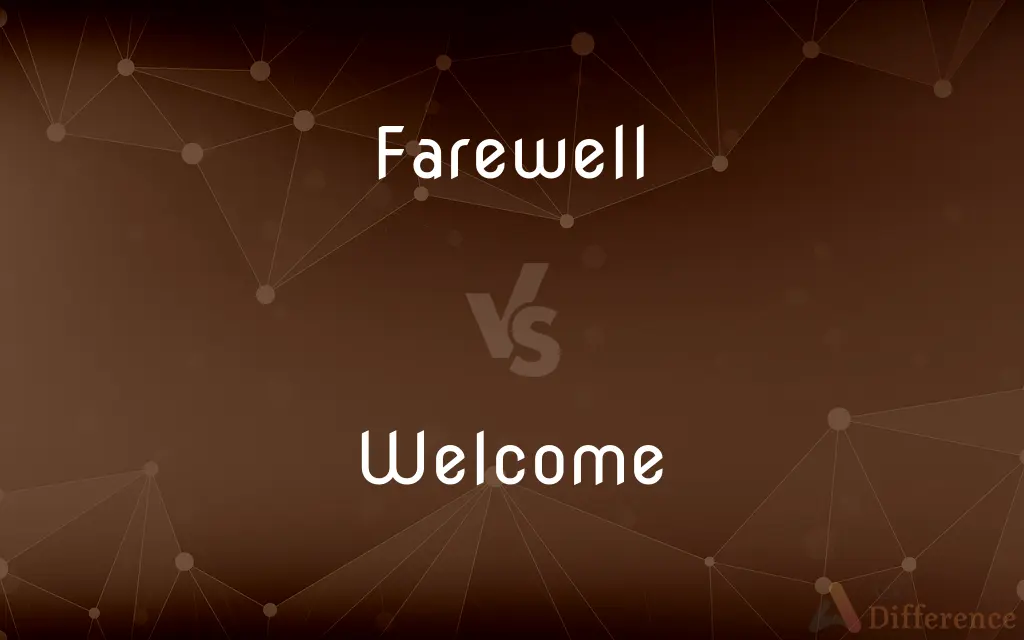Farewell vs. Welcome — What's the Difference?
By Maham Liaqat & Fiza Rafique — Updated on April 15, 2024
Farewell is an expression used to bid someone goodbye, often implying a departure; welcome is used to greet someone's arrival or return.

Difference Between Farewell and Welcome
Table of Contents
ADVERTISEMENT
Key Differences
Farewell is typically used when someone is leaving or parting ways, marking the end of an interaction or relationship for a period of time. Whereas, welcome is used at the beginning of an interaction or visit, expressing happiness at someone’s arrival.
The term farewell is often associated with a sense of sadness or nostalgia, as it can be used during significant partings, such as moving away or ending long associations. On the other hand, welcome conveys warmth and acceptance, often used in joyful or celebratory contexts.
Farewells can be formal or informal, ranging from a casual "bye" to more heartfelt expressions like "farewell for now," depending on the situation and the relationships involved. In contrast, welcomes can also vary in formality, from a simple "hello" to more elaborate greetings such as "welcome aboard" or "welcome home."
In many cultures, farewell involves rituals or specific customs, such as farewell parties or giving parting gifts. Conversely, welcoming often involves gestures of hospitality, such as offering drinks, food, or personal greetings, to make the person feel at home or valued.
Both farewell and welcome are significant in social interactions, influencing how relationships are perceived. Farewells are important for providing closure and showing respect for the past, while welcomes are crucial for establishing a positive tone and building rapport for the future.
ADVERTISEMENT
Comparison Chart
Usage Context
Used when someone is leaving.
Used when someone is arriving.
Emotional Tone
Often bittersweet or solemn.
Generally joyful and enthusiastic.
Formality
Can be both formal and informal.
Can be both formal and informal.
Associated Customs
Farewell parties, goodbye hugs.
Welcoming ceremonies, greeting cards.
Purpose
To bid goodbye and show appreciation for past interactions.
To greet and show appreciation for someone’s arrival or return.
Compare with Definitions
Farewell
A goodbye event.
The company organized a farewell party for the retiring manager.
Welcome
Used to greet someone arriving.
They shouted Welcome! as he walked through the door.
Farewell
Used to express good wishes on parting.
She waved farewell as her friend boarded the train.
Welcome
Expresses pleasure at someone’s arrival.
The welcome banner was hung across the main street for the festival.
Farewell
Can express hope of meeting again.
Farewell, until we meet again!
Welcome
Used to show relief or approval.
Your help is most welcome.
Farewell
Often implies a lengthy or permanent goodbye.
The emigrants bid their family farewell at the airport.
Welcome
Often associated with hospitality.
We received a warm welcome at the quaint bed and breakfast.
Farewell
Used in both spoken and written forms.
His farewell note was touching and heartfelt.
Welcome
Can indicate acceptance into a new condition or place.
Welcome to the team!
Farewell
Used to express goodbye.
Welcome
A welcome is a kind of greeting designed to introduce a person to a new place or situation, and to make them feel at ease. The term can similarly be used to describe the feeling of being accepted on the part of the new person.
Farewell
An acknowledgment at parting; a goodbye.
Welcome
An instance or manner of greeting someone
You will receive a warm welcome
He went to meet them with his hand stretched out in welcome
Farewell
The act of departing or taking leave.
Welcome
Used to greet someone in a polite or friendly way
Welcome to the Wildlife Park
Farewell
A wish of happiness or safety at parting, especially a permanent departure
Welcome
Greet (someone arriving) in a polite or friendly way
Hotels should welcome guests in their own language
Farewell
A departure; the act of leaving
Welcome
(of a guest or new arrival) gladly received
I'm pleased to see you, lad—you're welcome
Farewell
Parting, valedictory, final.
A farewell discourse;
The band's farewell tour
Welcome
Very pleasing because much needed or desired
The news will be most welcome to those whose jobs will now be safeguarded
After your walk, the tea room serves a welcome cuppa
Farewell
Goodbye.
He said "Farewell!" and left.
Welcome
Allowed or invited to do a specified thing
We arrange a framework of activities which you are welcome to join
Farewell
To bid farewell or say goodbye.
Welcome
Received with pleasure and hospitality into one's company or home
A welcome guest.
Farewell
Go well; good-by; adieu; - originally applied to a person departing, but by custom now applied both to those who depart and those who remain. It is often separated by the pronoun; as, fare you well; and is sometimes used as an expression of separation only; as, farewell the year; farewell, ye sweet groves; that is, I bid you farewell.
So farewell hope, and with hope, farewell fear.
Fare thee well! and if forever,Still forever fare thee well.
Welcome
Giving pleasure or satisfaction; agreeable or gratifying
A welcome respite from hard work.
Farewell
A wish of happiness or welfare at parting; the parting compliment; a good-by; adieu.
Welcome
Cordially or willingly permitted or invited
You are welcome to join us.
Farewell
Act of departure; leave-taking; a last look at, or reference to something.
And takes her farewell of the glorious sun.
Before I take my farewell of the subject.
Welcome
Used in the expression you're welcome to acknowledge an expression of gratitude.
Farewell
Parting; valedictory; final; as, a farewell discourse; his farewell bow.
Leans in his spear to take his farewell view.
Welcome
A cordial greeting or hospitable reception given to an arriving person.
Farewell
An acknowledgment or expression of goodwill at parting
Welcome
A reception upon arrival
Gave the stranger an unfriendly welcome.
Farewell
The act of departing politely;
He disliked long farewells
He took his leave
Parting is such sweet sorrow
Welcome
The state of being welcome
Don't overstay your welcome.
Welcome
To greet, receive, or entertain (another or others) cordially or hospitably.
Welcome
To receive or accept gladly
Would welcome a little privacy.
Welcome
Used to greet cordially a visitor or recent arrival.
Welcome
Whose arrival is a cause of joy; received with gladness; admitted willingly to the house, entertainment, or company.
A welcome visitor
Refugees welcome to education!
Welcome
Producing gladness.
A welcome present;
Welcome news
Welcome
Free to have or enjoy gratuitously.
You are welcome to the use of my library.
Welcome
Greeting given upon someone's arrival.
Welcome
The act of greeting someone’s arrival, especially by saying "Welcome!"; reception.
Welcome
The utterance of such a greeting.
Welcome
Kind reception of a guest or newcomer.
We entered the house and found a ready welcome.
Welcome
The state of being a welcome guest.
Welcome
To affirm or greet the arrival of someone, especially by saying "Welcome!".
Welcome
To accept something willingly or gladly.
We welcome suggestions for improvement.
Welcome
Received with gladness; admitted willingly to the house, entertainment, or company; as, a welcome visitor.
When the glad soul is made Heaven's welcome guest.
Welcome
Producing gladness; grateful; as, a welcome present; welcome news.
Welcome
Free to have or enjoy gratuitously; as, you are welcome to the use of my library.
Welcome
Salutation to a newcomer.
Welcome
Kind reception of a guest or newcomer; as, we entered the house and found a ready welcome.
His warmest welcome at an inn.
Truth finds an entrance and a welcome too.
To thee and thy company I bidA hearty welcome.
Welcome
To salute with kindness, as a newcomer; to receive and entertain hospitably and cheerfully; as, to welcome a visitor; to welcome a new idea.
Thus we salute thee with our early song,And welcome thee, and wish thee long.
Welcome
The state of being welcome;
Don't outstay your welcome
Welcome
A greeting or reception;
The proposal got a warm welcome
Welcome
Accept gladly;
I welcome your proposals
Welcome
Bid welcome to; greet upon arrival
Welcome
Receive someone, as into one's house
Welcome
Giving pleasure or satisfaction or received with pleasure or freely granted;
A welcome relief
A welcome guest
Made the children feel welcome
You are welcome to join us
Common Curiosities
What does welcome mean?
Welcome is a greeting used to express happiness at someone's arrival.
What are some common farewell customs?
Common customs include farewell parties, goodbye hugs, and sometimes giving parting gifts.
Can farewell be used for temporary partings?
Yes, farewell can be used for both temporary and permanent departures.
Can the terms farewell and welcome be used interchangeably?
No, farewell and welcome are used in opposite contexts, one for departures and one for arrivals.
What does farewell mean?
Farewell is a way of saying goodbye, often when someone is leaving for a long time or permanently.
Is welcome only used in person?
No, welcome can be expressed in person, in writing, or digitally, whenever someone is greeted.
Why is saying farewell important?
Saying farewell acknowledges the end of an interaction and shows respect for the relationship.
What makes a welcome warm and genuine?
A warm welcome often involves personal touches like using the person's name, a smile, or tailored gestures of hospitality.
What is the significance of farewell and welcome in literature?
In literature, these terms often symbolize beginnings and endings, transitions in character development, or changes in setting.
Is a welcome always positive?
Typically, yes, a welcome is meant to be positive and inviting, though it can be sarcastic or insincere in some contexts.
How do businesses use these terms?
Businesses use "farewell" when an employee leaves or a service ends, and "welcome" when greeting customers or new employees.
How do different cultures express welcome?
Different cultures might have unique welcoming customs, such as presenting flowers, performing dances, or special greetings.
How do farewells affect emotional well-being?
Farewells can be emotional, often involving feelings of sadness or loss, but they also provide closure.
Can farewell and welcome be formalized in ceremonies?
Yes, both can be part of formal ceremonies, like farewell banquets or welcome receptions.
What role do farewells play in social rituals?
Farewells are integral to social rituals, marking transitions and showing collective respect or affection for someone leaving.
Share Your Discovery

Previous Comparison
Item vs. Idem
Next Comparison
Luck vs. ProvidenceAuthor Spotlight
Written by
Maham LiaqatCo-written by
Fiza RafiqueFiza Rafique is a skilled content writer at AskDifference.com, where she meticulously refines and enhances written pieces. Drawing from her vast editorial expertise, Fiza ensures clarity, accuracy, and precision in every article. Passionate about language, she continually seeks to elevate the quality of content for readers worldwide.














































